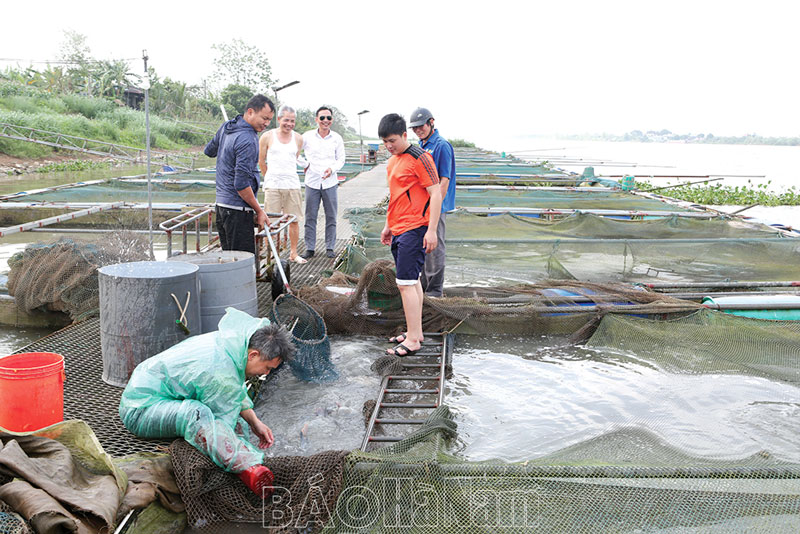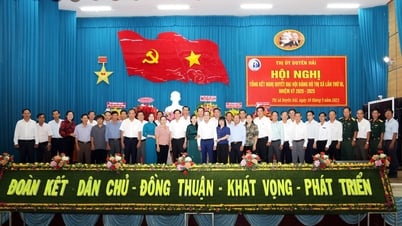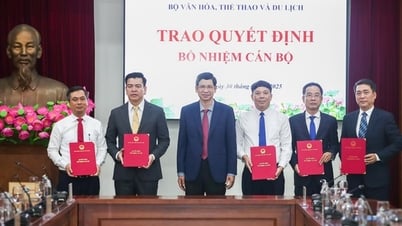Implementing Decision No. 1058/QD-TTg dated September 14, 2023 of the Prime Minister approving the Strategy for Rural Sector Development to 2030, with a vision to 2045, in recent times, Ha Nam province has directed the implementation of many solutions to promote the development of diverse industrial and handicraft sectors associated with practical conditions and strengths of the locality. Thereby, contributing to helping communes build new rural areas (NTM) to improve and soon complete the criteria on income, labor, and poor households.
According to Decree 52/2018/ND-CP dated April 12, 2018 of the Government , rural industry activities in the province are divided into 6 groups of industries, including: Processing and preserving agricultural, forestry and fishery products; production of handicrafts; processing and handling of raw materials for rural industry production; production of wooden products, rattan and bamboo, ceramics, textiles, yarn, embroidery, knitting, small mechanics; production and trading of ornamental plants; services for production and life of rural residents.
Information from the Department of Agriculture and Rural Development shows that the province currently has about 27,000 production and business establishments in various industries, including nearly 7,800 establishments in craft villages and traditional craft villages (including households, enterprises, cooperatives, and cooperative groups). These establishments provide jobs for nearly 57,000 workers. Through these figures, it can be seen that, in addition to paying attention to maintaining and promoting the effectiveness of craft villages and traditional craft villages, in recent times, localities in the province have also focused on developing rural industry groups. The activities of rural industry establishments have been and are making an important contribution to job creation and creating a stable source of income for a large rural labor force.

Identifying industry and handicrafts as key economic sectors, contributing significantly to the commune's completion of the criteria for poor households and income, while creating leverage to implement the remaining criteria in the set of criteria for advanced NTM communes and model NTM communes, Tien Thang commune (Ly Nhan) has maximized the potential and advantages of the locality in terms of transportation, geography, and human resources (adjacent to Nam Dinh city, with National Highway 38B passing through, people are industrious and hard-working) to develop a variety of rural occupations such as industrial sewing, carpentry, mechanics, construction, food processing, etc. Thanks to that, from a purely agricultural commune, people's lives depend mainly on agricultural production, with per capita income among the lowest in the district, in 2023, Tien Thang commune has completed 19/19 criteria for advanced NTM communes. In 2024, the commune strives to achieve the target of local people's income reaching 76.5 million VND/person.
Mr. Tran Trung Ha, Chairman of Tien Thang Commune People's Committee, said: To promote economic development, towards building a model new-style rural commune, Tien Thang commune has carried out economic restructuring towards increasing the proportion of industry, handicrafts and services, developing diverse occupations to help people increase income and sustainably reduce poverty. To achieve the set goals, the commune pays special attention to vocational training for workers, especially industrial sewing, food processing, etc. Therefore, people in Tien Thang commune now no longer only know how to herd buffaloes, raise pigs, and grow rice, but about 80% of the working-age population in the area participates in industrial, handicraft and commercial activities.
In order to maintain traditional craft villages in particular and promote the development of rural industries in general, in recent times, functional sectors and localities in the province have promoted propaganda work to raise awareness of cadres, party members and people about the development of rural industries; doing a good job of preserving, developing craft villages and protecting the environment; supporting production establishments, cooperatives and enterprises to build a system of traceability, geographical indications, collective trademarks, and brand identification for craft village products; building an electronic information page to introduce and promote products and sell online; guiding and supporting production entities in craft villages to prepare documents to participate in the evaluation and ranking of OCOP products.
Along with that, promote trade promotion, support production establishments to participate in fairs and exhibitions to find outlets for craft village products; support and train employers in craft villages to improve management skills and digital transformation; encourage production establishments to invest in technological innovation, apply new and advanced technologies into production to improve productivity, product quality, and minimize environmental impacts; effectively implement industrial promotion work, support production establishments to apply technology, improve machinery to improve productivity and product competitiveness...
Ms. Cu Thi Thu Huong, Head of the Department of Industrial Management (Department of Industry and Trade) said: In order to promote the development of rural industries, in recent years, the Department of Industry and Trade has organized and created conditions for enterprises and rural industrial establishments in the province to participate in fairs and exhibitions to promote products and seek consumer markets; implemented many projects to support rural industrial establishments in applying advanced machinery and equipment to production from national and local industrial promotion funds. In recent years, the department has also done a good job of advising the Provincial People's Committee to consider recognizing the titles of artisans and skilled workers and selecting typical rural industrial products of Ha Nam province; coordinated with the Vietnam Craft Village Association to organize seminars on marketing handicrafts for export in the province; strengthened propaganda and guidance for food production establishments to raise awareness of food safety; implemented knowledge confirmation and granted certificates of establishments meeting food safety conditions to ensure the provisions of law for food production establishments.
Clearly identifying the importance of rural industries in promoting economic development, creating jobs, and improving the lives of rural people, according to the plan, in 2024, the Department of Agriculture and Rural Development will continue to implement the Plan for preserving and developing craft villages in Ha Nam province for the period 2021-2030; maintain and consolidate 58 traditional craft villages currently operating and encourage the development of new industries and craft villages; review and propose a number of mechanisms and policies to support the development of rural industries and craft villages in the province; urge and guide districts, towns and cities to develop and implement plans to protect the environment of craft villages according to regulations; focus on mobilizing resources, especially socialized capital as well as integrating capital from programs and projects to support the conservation and development of craft villages; Invest in upgrading infrastructure of craft villages, minimize activities that cause environmental degradation, and encourage the development of a green - clean - beautiful environment in rural areas.
Nguyen Oanh
Source: https://baohanam.com.vn/kinh-te/nganh-nghe-nong-thon/quan-tam-phat-trien-nganh-nghe-nong-thon-126491.html


![[Photo] Journalists moved to tears at the Memorial Service for the soldiers who died in Gac Ma](https://vphoto.vietnam.vn/thumb/1200x675/vietnam/resource/IMAGE/2025/5/30/9454613a55c54c16bf8c0efa51883456)
![[Photo] General Secretary To Lam receives Chief of the Central Office of the Lao People's Revolutionary Party](https://vphoto.vietnam.vn/thumb/1200x675/vietnam/resource/IMAGE/2025/5/30/140435f4b39d4599a3d17975dfb444c5)

![[Photo] National Conference "100 years of Vietnamese Revolutionary Press accompanying the glorious cause of the Party and the nation"](https://vphoto.vietnam.vn/thumb/1200x675/vietnam/resource/IMAGE/2025/5/30/1cf6cd5c8a934ebfa347028dcb08358c)

![[Photo] A delegation of 100 journalists from the Vietnam Journalists Association visits the soldiers and people of Truong Sa island district.](https://vphoto.vietnam.vn/thumb/1200x675/vietnam/resource/IMAGE/2025/5/30/0984a986227d4e988177f560d2e1563e)

















































































Comment (0)